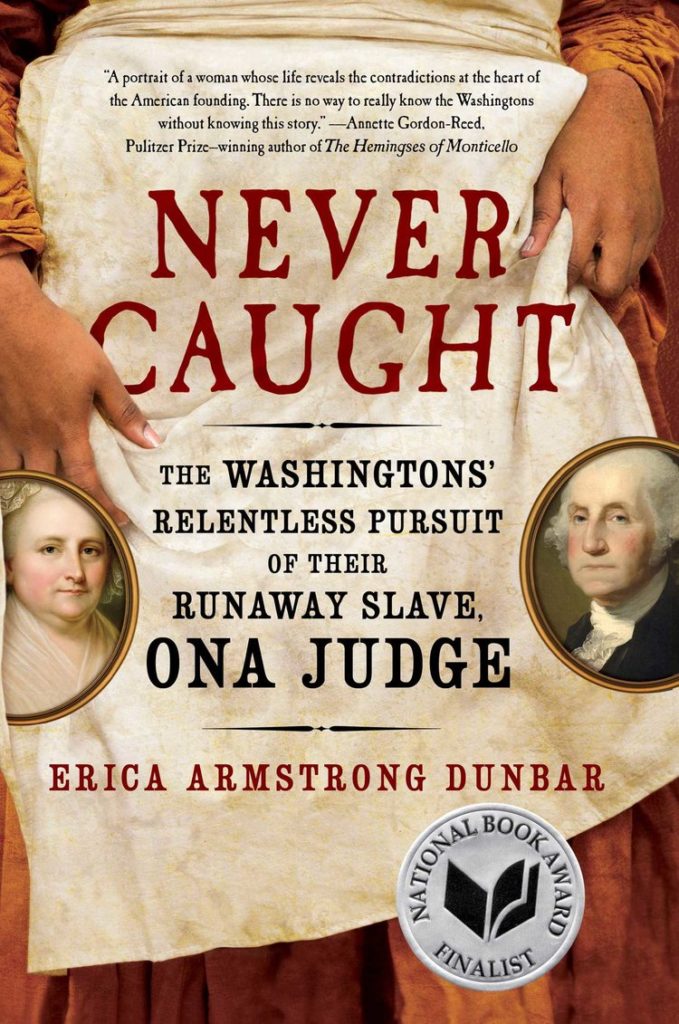AntiBlackness and white supremacy are all around us — in what we learn and don’t learn as Americans.
Let’s talk about what we learned about George Washington.
Growing up in America, I learned the endearing tale of George Washington chopping down the cherry tree — he never told a lie.
I did not learn ANY of the following facts:
- George Washington was an enslaver — at the time of his death he personally owned 123 enslaved people. Together, he and Martha owned over 300 enslaved people and in total George Washington, inherited, purchased, rented, and gained control of more than 500 enslaved people.
- George Washington signed into law the Fugitive Slave Act in 1793 (here’s a short video explaining the Act as well as the Washingtons’ relentless pursuit of his “fugitive slave” Ona Judge)
George and Martha Washington schemed for five years to circumvent the law in Pennsylvania that required the emancipation of all adult slaves who were brought to Pennsylvania for more than six months. During his presidency, the Washingtons designed and implemented a slave shuffle from 1791 to 1796, rotating his slaves out of Pennsylvania to evade the law. The Washingtons also worked to keep their enslaved people from learning of this law and their potential rights of freedom. - After Martha Washington’s enslaved young woman, Ona Judge escaped the Executive Mansion on May 21, 1796, the Washingtons began a relentless pursuit to recapture her. They posted runaway advertisements advising vessels not to transport her and they offered a $10 reward to any person (white or Black) to anyone returning her.
- When Ona Judge was located in New Hampshire, later that summer, George Washington enlisted “the services of the federal government to quietly recapture the fugitive.” (p137) George Washington sought the help of the Secretary of the Treasury, Oliver Wolcott Jr. “The president offered suggestions about recapturing the fugitive, and all of them were clear violations of the law. Washington understood the Fugitive Slave Act of 1793, after all, he had signed the bill. His advice for the customs collector conveniently sidestepped all of the regulations that were in place to appropriately return a runaway to his or her owner.” (p139) Never Caught, Erica Armstrong Dunbar
- In 1799 George Washington had his nephew, Burwell Bassett Jr (a member of the Virginia Senate), seek the help of Senator John Langdon in New Hampshire in efforts to capture Ona Judge. Bassett confronted Ona Judge and when she refused to return, he planned to return Ona Judge by force.
- George Washington’s dentures were likely made from the pulled teeth of enslaved people. Read more about Washington in this Washington Post piece by Michelle Norris.
Take a few minutes to review the Mount Vernon website to see how they describe George Washington’s relationship to chattel slavery:
- The main webpage devoted to Slavery
- A webpage devoted to George Washington and Slavery
- A webpage titled Washington’s Changing Views on Slavery
- See if how long it takes you to find information about Ona Judge… there is a page but it isn’t prominently displayed. (Here is the webpage if you don’t locate it — Ona Judge)
- A webpage titled George Washington’s Will
What do you make of the way Mount Vernon presents information about George Washington’s role as an enslaver and President?
What speaks loudest to you when asked what George Washington’s views on slavery were?
- His action signing the Fugitive Slave Act of 1793 into law
- His role as an enslaver
- His active evasion of the Pennsylvania Gradual Abolition Act of 1780
- His pursuit of Ona Judge (including the use of federal government resources)
- His Will emancipating his slaves upon Martha Washington’s death
In The 1619 Project, Nikole Hannah-Jones says that when she learned that the first enslaved Africans arrived at Point Comfort on the White Lion in 1619, a year before the Mayflower, she asked why she had never learned this fact. She also instantly knew that it was not an innocuous omission. What does her revelation tell you about the history we all know in America? Did you know any of what is described in this post about George Washington? Why do you think that is?
If you want to know how American history is being taught in public schools today, there’s no need to guess. Take a look at this Report from the Southern Poverty Law Center and this Report from the Zinn Education Project.
The last part of this AntiRacism Exercise is ACTION. There is no AntiRacism without ACTION.
I have my own opinion about how Mount Vernon describes George Washington and his role as an enslaver–It’s still white-washed. The presentation and language convey a watered down, softer, mixed message when the facts seem pretty clear. What do you think?
What action can you take? What is within your circle of control? Can you contact Mount Vernon? Can you start a petition? Can you share this information broadly? Can you share Erica Armstrong Dunbar’s book? Can you have a conversation about this in your home and in your community?
I also noticed a page on the Mount Vernon website encouraging the reader to consider “the context of his [George Washington’s] 18th-century culture” as if that somehow excuses or justifies his actions. If we look we will find that Germantown Quakers “declared slavery oppositional to their religious beliefs” in 1688. And in 1711 the Society of Friends from Chester County asked the Yearly Meeting to prohibit Quakers from purchasing new slaves which ultimately culminated in the first antislavery law in America in 1780, the Pennsylvania Gradual Emancipation Act. Some people tried to do the right thing — granted it took an entire century…
Chattel slavery was never right, it was never moral, it was never ethical, and it was never justifiable.

